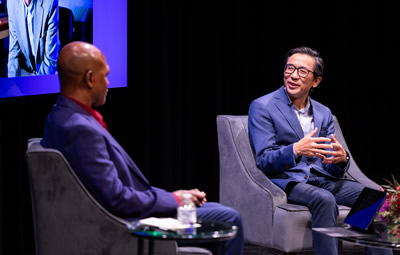Hearing science expert kicks off 2025-26 Dialogue with the Dean series
 Fan-Gang “Frank” Zeng, accomplished researcher and a rock star of the audiology community, built his storied career on understanding and reversing hearing loss, an alarmingly common but often ignored condition affecting tens of millions of Americans. Zeng was Dean E. Patrick Johnson’s first guest in the School of Communication’s 2025-26 Dialogue with the Dean series, which on October 20 drew 100 faculty, students, and audiology enthusiasts to the Wirtz Center’s Clara, Lu-N-Em Theater. Many more joined the conversation online.
Fan-Gang “Frank” Zeng, accomplished researcher and a rock star of the audiology community, built his storied career on understanding and reversing hearing loss, an alarmingly common but often ignored condition affecting tens of millions of Americans. Zeng was Dean E. Patrick Johnson’s first guest in the School of Communication’s 2025-26 Dialogue with the Dean series, which on October 20 drew 100 faculty, students, and audiology enthusiasts to the Wirtz Center’s Clara, Lu-N-Em Theater. Many more joined the conversation online.
“Often we make things very complicated,” Zeng stated right out of the gate. “I make complicated things easier to understand, easier to solve.”
Despite the simple assessment of his work, Zeng’s professional title is a dizzying paragraph unto itself: he is Chancellor’s Professor of Anatomy and Neurobiology, Biomedical Engineering, Cognitive Sciences, Otolaryngology–Head and Neck Surgery, and Director of the Center for Hearing Research at University of California, Irvine. With several hundred publications and tens of thousands of citations under his belt, he is widely regarded as a leading voice in hearing science and technology. Among many other notable achievements, Zeng led the development of Nurotron 26-electrode cochlear implant—a game changer for people with profound hearing loss— and the SoundCure tinnitus suppressor.
Zeng was forthcoming about the challenges that face those pursuing hearing interventions, surgical and otherwise, and much of it is financial. Hearing aids cost thousands of dollars; cochlear implants, which require surgery, can cost up to $100,000; and gene therapy, which Zeng sees as the most promising and least invasive long-term intervention, is off the charts.
This, he said, is keeping people from pursuing hearing health care.
“Lack of competition hinders innovation and makes the price of these devices less accessible,” he said. “It’s a monopoly, and what I try to do is sort of break the monopoly.”
Some estimates suggest that close to 50 million people in the U.S. experience some degree of hearing loss. If one were to include milder cases, the number swells to nearly 73 million; about 10 percent of children and teens are among them. Zeng said that up to 300 million people worldwide could benefit from gene therapy, which introduces modified or fully functioning genes to the inner ear, usually in the form of an oral pill. In addition to working to break down the barriers to access, Zeng embraces interdisciplinary collaboration as a boon to the field of audiology and its researchers and clinicians.
“What it takes to create a medical device requires many different disciplines,” he said. And as the interventions are honed and become more widely embraced, the expertise needed to implement these systems will swell.
The ninety-minute conversation touched on apprehension around AI (“Every technology when it first emerges, we always have that fear. Even fire! Think about civilization—we were afraid of fire!”); or turning to industry or philanthropic sources to make up for federal funding losses (“You have to demonstrate your value…this is a concept that professors have to think a little bit more about.”); and even, of all things, soap operas. Dean Johnson revealed his longtime abiding love for The Young and the Restless, explaining that one character’s story arc centered around his cochlear implants. But Zeng needed no such explanation.
“I came to the U.S. from Shanghai to Syracuse in 1987,” he said, then humming the theme song, “and we learned English from The Young and the Restless.”
Dean Johnson turned the questions over to the audience, but not before asking if Zeng had a favorite sound.
“My favorite sounds are pure tones,” he said, eliciting laughter from an audience in the know. “You can only get it in laboratory conditions.”
Lucky for those in attendance, Zeng is far more accessible. And a pure delight.
